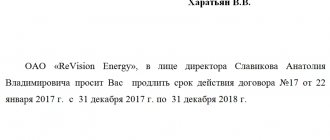Duration of fixed-term employment contracts
Professional relationships between an employer and a subordinate are initiated with the signing of an employment contract.
The rental agreement can be concluded:
- for an indefinite period (indefinite);
- for a specific period (urgent).
If a rental agreement is drawn up for an indefinite period, it does not specify the duration of its validity. Only the date of entry into force of the agreement is determined by documents.
The maximum period of time during which a fixed-term contract is valid is no more than five years.
The contract may be valid for a very short time, for example, two or three months. This is relevant if the work is short-term.
If a fixed-term contract is concluded for the implementation of work, the completion of which is not tied to a specific date, it will be terminated after completion of all work.
Probation period for a fixed-term contract
The use of a probationary period or its absence depends on how long the applicant plans to work for his employer.
A probationary period is not introduced if the employment relationship is formalized for the performance of certain work, the duration of which will not exceed two months.
If an employee is employed for a period of two to six months, the employer has the right to introduce a probationary period. In this case, the hired person is tested for professional suitability for no longer than two weeks. If we consider a contract that will be valid for more than six months, the trial period can range from three to six months.
The following persons may not be tested:
- a woman preparing to become a mother;
- women who have children no older than one and a half years;
- workers invited to work as a transfer from another organization;
- citizens with secondary vocational or higher education who started working for the first time;
- minor citizens.
How to renew
A fixed-term contract can be extended by concluding an additional agreement specifying the conditions before its expiration. But this cannot be done repeatedly, especially if the employee performs the same job. If a labor dispute arises, the court will most likely recognize the extended contract as indefinite.
clause 14 of the Resolution of the Plenum of the Supreme Court of the Russian Federation dated March 17, 2004 No. 2
The same will happen if the employee continues to work after the end of the contract, and the employer forgets to remind him of the termination in writing 3 calendar days in advance. This does not apply if the employee is replacing a permanent employee.
Part 4 Art. 58 Labor Code of the Russian Federation
When is a fixed-term employment contract concluded?
Labor legislation provides for two groups of circumstances that allow concluding fixed-term employment contracts:
- the nature of the work to be performed or the conditions for its implementation do not allow the establishment of an employment relationship for an indefinite period;
- there is an agreement between the parties to the employment contract, on the basis of which a fixed-term contract can be concluded without taking into account the nature of the work to be done.
Reasons for concluding a fixed-term contract that fall into the first category:
- the need to perform temporary and seasonal work (if, due to natural conditions, work can only be carried out for a certain period);
- sending an employee to work abroad;
- the work is related to internship and professional training of the employee;
- if a citizen is sent to perform alternative civil service;
- sending an employee to community service;
- election to an elected body or to an elective position;
- the need to replace an absent employee, who retains his place of work, etc.
The list of reasons indicated is not exhaustive.
If there is agreement between the parties, a fixed-term contract can be concluded for the following reasons:
- the subordinate works part-time;
- the person hired is a full-time student;
- the worker has reached retirement age;
- there is a doctor’s conclusion confirming the need to draw up such an agreement;
- urgent work to eliminate the consequences of an emergency, etc.
Differences from an open-ended contract
Making an entry in the Labor Code is based on regulatory documents, in particular, determined by the provisions of the Instructions for filling out the Labor Code and labor inserts.
The provisions came into force on October 10, 2003, under No. 69.
Any standard or non-standard situation requires the employer to refer to this document.
The Instructions do not indicate special rules that will differentiate the entry for employment under a fixed-term contract.
This means that making a record of hiring a person with a deadline established for the performance of work should not differ in any way from a regular, standard record .
Those employers who fear that a State Labor Inspectorate inspector will subsequently point out a discrepancy between the terms of the employment contract and the entry in the employment record must understand that the rules are unified in nature and must be observed in all cases.
The legislation provides that sometimes fixed-term contractual relationships are not interrupted , but are extended further. If such a precedent exists in labor practice, all employers should be aware of similar legal consequences.
Regardless of how relevant and strict the time frame is set in each specific case, circumstances are subject to change.
In addition, during the specified period, the employee has the right to resign on his own initiative . In this case, the dismissal date specified upon hiring will be considered irrelevant.
REFERENCE: If, when hiring under a fixed-term employment contract, an entry in the work book was made incorrectly. The employer will need to correct it in accordance with the provisions of the Instructions .
The employee’s work record should not be affected if circumstances change on the basis of Article 72 of the Labor Code of the Russian Federation. Accordingly, upon dismissal, when it becomes clear that the employee is leaving within the specified period, a corresponding entry must be made.
Expiration of the contract
A contract concluded for a short period of time may be terminated for the following reasons:
- all work specified in the contract has been completed;
- the agreement has expired;
- the season has ended if the subordinate was hired for seasonal work;
- The main employee returned to work, and a new worker was hired to replace him.
If the contract has expired, management can take the following steps to choose from:
- end the relationship with a subordinate;
- to extend the contract;
- sign a new contract with the worker for the same or a different period.
How to fire an employee at the end of the contract
If management decides to terminate the employment contract upon expiration, it is obliged to inform the worker about this three working days before dismissal. This is done in writing.
A notice of termination of an employment contract must contain the following information:
- name of company;
- Full name of the employee;
- reason for dismissal (expiration of the contract);
- the date from which the contract becomes invalid;
- date of document execution;
- compiler's signature.
The employee must be informed of his dismissal in advance
If a subordinate is not properly informed about the upcoming termination of employment, and his dismissal takes place, he may apply to the court for reinstatement.
An organization I know hired an employee under a fixed-term employment contract. After the contract expired, settlement was made with it. Thus, the dismissed person joined the ranks of the unemployed. However, the matter did not end there. A former employee of the organization filed a lawsuit demanding that he be given back the opportunity to work in the position he filled. In addition, the citizen demanded to recover from the employer a sum of money for the period of forced absence and compensation for moral damage. The court satisfied the plaintiff's demands because the boss did not inform the subordinate about the termination of his employment relationship.
If the contract was concluded for the duration of the work, then the dismissal procedure upon expiration of its validity period is initiated with the execution of an act of acceptance of work. To do this, you can use the unified form of document No. T-73.
The certificate of completion of work is drawn up according to the unified form No. T-73
Next, the HR department issues an order to dismiss the subordinate. The person being dismissed must familiarize himself with such an order.
At the last stage of termination of a fixed-term employment contract, the HR department draws up and issues an order to dismiss the employee
The dismissal of a pregnant woman after the expiration of the contract occurs somewhat differently. The boss is obliged to renew the contract if the employee presents a corresponding application and a doctor’s certificate that confirms her condition. The contract period will then last until the end of the pregnancy.
Dismissal may occur on the following days:
- on the day the maternity leave ends;
- on any day within a week from the day the employer learned about the end of the pregnancy.
However, there are situations when a woman in a position can be fired immediately upon expiration of the contract.
This is possible if:
- a fixed-term employment contract was concluded for the duration of someone’s duties;
- transfer of an employee with her consent to another job available to the employer and not contraindicated for her health reasons is impossible.
How to extend a fixed-term employment contract
The legislation does not contain a prohibition on extending a fixed-term contract. This means that, if desired, the parties can extend the employment relationship.
However, multiple extensions of a fixed-term contract turns it into an open-ended employment contract.
This poses a certain risk for the employer, because if the contract becomes permanent, some conditions of the labor process change.
If the employer decides to do this, the extension of the period occurs in the following order:
- The initiator of the contract extension contacts the other party in writing with a corresponding proposal.
- Next, the boss and subordinate sign an additional agreement, which specifies all the necessary changes.
- A corresponding order is issued.
The order to extend a fixed-term employment contract indicates the number of the expired agreement
The legislation makes it possible to extend the term of the contract with the following persons:
- pregnant women;
- university employees;
- athletes.
It is better to terminate the contract with the remaining employees and then enter into a new one.
Is early termination of the contract legal?
Early termination of a temporary contract is not prohibited.
The reasons for this may be:
- consent of each party to such an outcome of the case;
- employee's desire;
- employer initiative.
The management of the organization may decide to terminate the contract early if the following occurs:
- liquidation of the organization;
- reduction in the number of employees or staff reduction;
- failure of the employee to pass certification;
- change of owner of the company;
- violation of labor discipline by an employee, if there have already been other disciplinary sanctions, etc.
However, management does not have the right to dismiss all workers early.
I know of a case where the management of an organization tried to terminate an employment contract concluded with an employee for a certain time ahead of schedule. However, during the trial it was established that the employer did not have the right to do so. A worker cannot be dismissed early if he is replacing a permanent employee who retains his job.
How to prove that a contract with an employer is a contract for an indefinite period?
When going to court with demands to recognize an employment contract as concluded for an indefinite period, and not for the period specified in the contract, it is necessary to prove to the court that the contract is of unlimited duration.
What can serve as evidence of the validity of the plaintiff’s claims?
- when the contract and job description do not indicate that the employee was hired to perform some temporary work
- when the contract specifies a basis for the urgency of its conclusion, which is not provided for by law or which does not actually exist for a particular employer. For example, concluding an agreement to perform work that goes beyond the normal activities of the organization, but in fact this is not the case, which can be confirmed by the provisions of the charter, other documents, including documents of the employer
- in the case of a fixed-term contract being forced by an employee, it is necessary to prove that, for example, the employer forced the employee to conclude a fixed-term contract. Evidence may include witness testimony, information about the employer’s vacancy, in which there was no indication of the urgent nature of the employment relationship
- if a fixed-term contract is concluded on a certain basis, which in reality does not exist, then it is necessary to provide evidence of the absence of such basis. For example, concluding a fixed-term contract allegedly by agreement of the parties, but on the part of the employee there was in fact no such agreement and he was forced to enter into a fixed-term contract because he could not find work for a long time, which is confirmed by information from the employment center, he had debts, which can be confirmed by receipts for payment of utility bills services, information about enforcement proceedings
As you can see, specific evidence depends on the situation in which the fixed-term contract is concluded. Therefore, in each specific case it is necessary to understand and think about what can confirm certain facts.
Reasons for termination
A fixed-term employment contract is terminated if:
Completion dates
- The contract period has passed.
- When an employee performs the duties of a temporarily absent key employee. The contract expires from the moment the latter starts work. There is no need to notify the employee. But there is one point: if the contract does not indicate the reason for its conclusion, but only the validity period, then it can be terminated with the consent of the parties.
- If temporary work was carried out, the contract loses its force upon completion of this work.
- A fixed-term contract drawn up for seasonal work ends with the end of the season.
If the contract period is calculated in years, then the final day of the contract is a certain date of the last year: in months - the number of the month defined as the final one. If the last day of the contract falls on a weekend, then a transfer is made to the next working day.
It is possible to terminate a fixed-term employment contract at your own request. In this case, the employee, even if he is on vacation or sick, is obliged to notify the employer in writing of his decision two weeks in advance. This time period is necessary to find a replacement.
If the right candidate is found before the end of the two-week period and is fully ready to begin his duties, then by agreement of the two parties, the contract can be terminated ahead of schedule.
Employees who have signed a fixed-term contract of up to two months or a season are required to notify the employer of their desire to terminate the contract early in writing and three calendar days in advance.
A fixed-term employment contract is not valid after the end of the appointed period or completion of the proposed work. The agreement can be terminated early by agreement of the parties.









